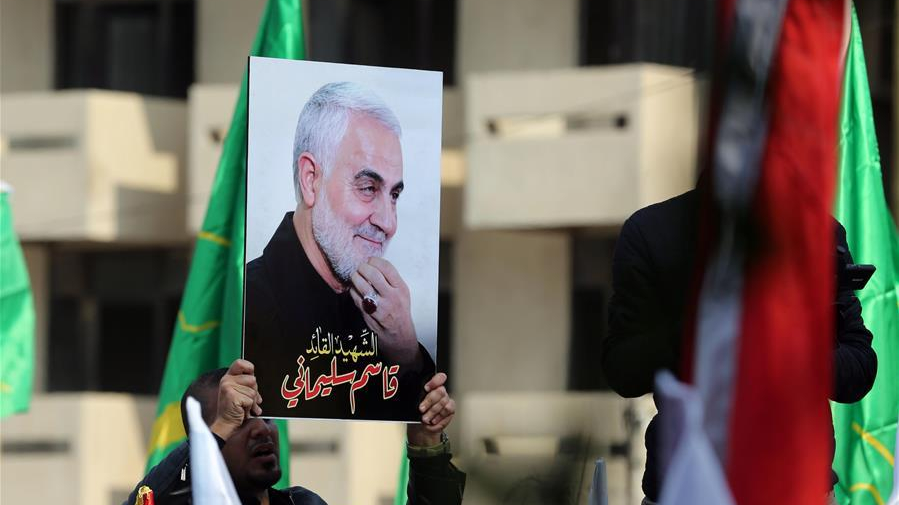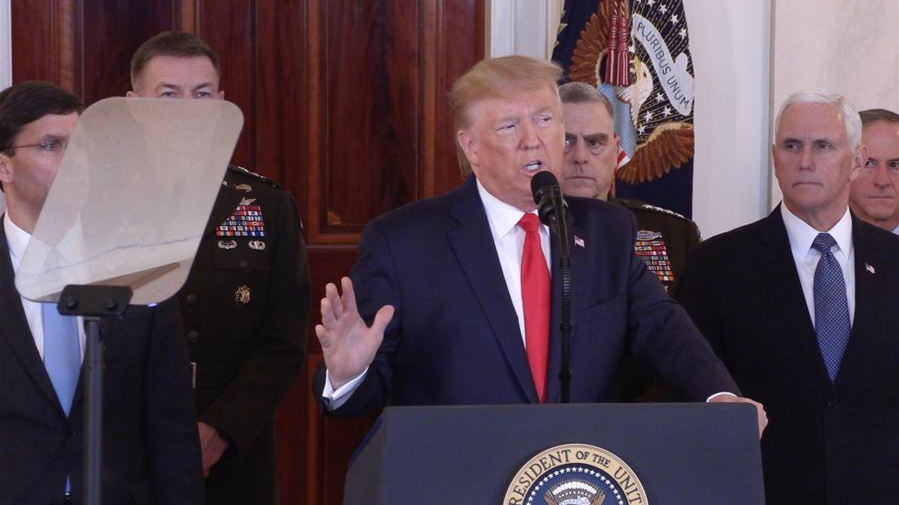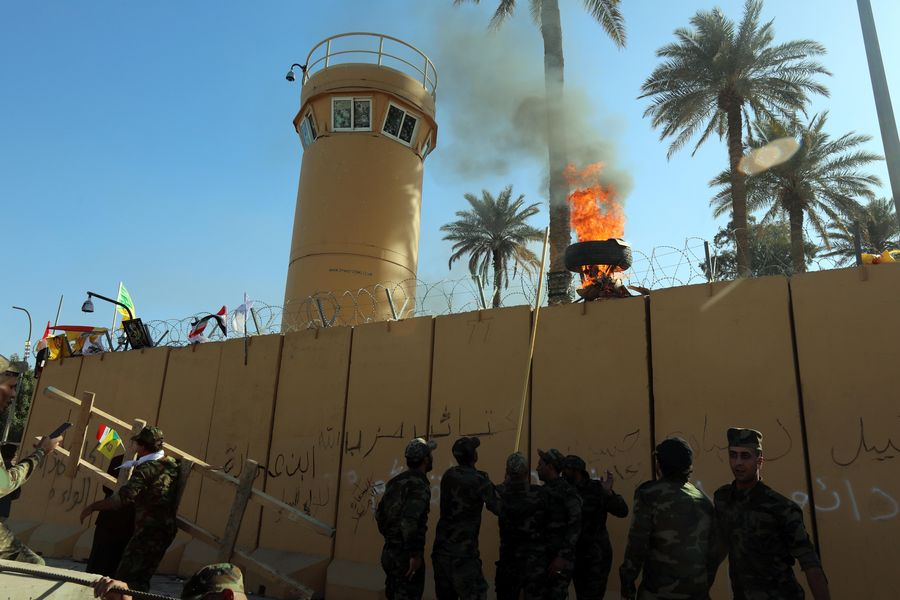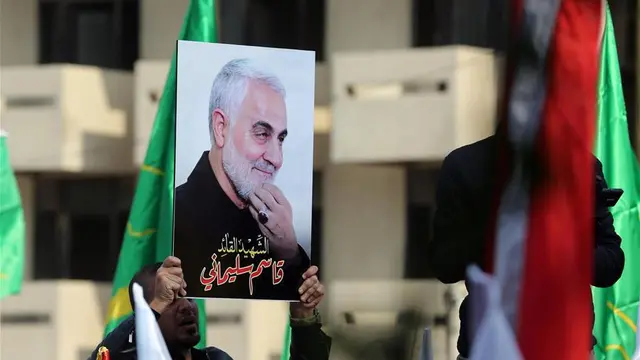
A mourner holds a picture of senior Iranian commander Qasem Soleimani in Baghdad, Iraq, January 4, 2020. /Xinhua Photo
**Editor's Note: **Huo Zhengxin is a professor of law at the China University of Political Science and Law. The article reflects the author's opinions and not necessarily the views of CGTN.
The United States killed Qasem Soleimani, the former commander of the Quds Force of Islamic Revolution Guards Corps (IRGC), in a drone attack on January 3 outside Baghdad International Airport, shocking the world. Four days later, Iran launchedmissiles at U.S. military bases in Iraq in retaliation. Developments are ongoingand it's the time to analyze whether the U.S. hasthe legal authority to execute such a deadly strikeunder the international law.
In my opinion, to answer this question, a two-step process has to be followed: First, what are the arguments of the U.S. to defend the killing of Soleimani? Second, do these hold water under international law?
Seeking to defend the killing, the U.S. government highlights two arguments: First, the IRGChas been designated as "aforeignterrorist organization" by the United States. As a result, Qasem Soleimani, is "a terrorist mastermind". President Donald Trump goes even further to labelhim as "world's number one terrorist". For this reason, Trump defensedthat "We take comfort in knowing his reign of terror is over". Second, accordingto Trump, Soleimani "was plotting imminent and sinister attacks on American diplomats and military personnel, but we caught him in the act and terminated him."

U.S. President Donald Trump (C) delivers a statement at the White House in Washington, DC, U.S., January 8, 2020. /Xinhua Photo
Though the U.S. explanations have sound logic at first glance, a careful assessment under international law may lead to an opposite answer.
First of all, it should be emphasized that the IRGC was designed as a terrorist organization by the U.S. unilaterally instead of by UN Security Council. Although there's alack of universal agreementon the definition of terrorism or terrorist group under international law, two principles must be noticed: (1) a particular state does not have the legal authority to declare a terrorist organization under international law; (2) State entities, generally speaking, should not be placed in the list of terroristorganizations.
In the light of these two principles, the U.S.'s declarationthat IRGC is a terrorist organization is hardlyestablished.The IRGCis not a terrorist group at all according tothe UN Security Council even though ithad its assets frozen but it was lifted in 2016. More importantly, the IRGC is a branch of the Iranian Armed Forces, which means it's part of the Iranian government. In light of these, the U.S.'s first agreement is groundless.
Then, is the second argument of United Statesjustified under international law? As mentioned above, the U.S. allegedthe danger posed by Soleimani whichprompted the U.S. to conduct this strikeis "imminent". In other words, the U.S. has beenarguing that the strike was out of some anticipatory self-defense. However, the killing of Soleimani didnot meet theelements of lawful self-defense under the international law.
As a general principle, outside of an on-going armed conflict, international law prohibits the use of force, which is a peremptory norm codified in UN Charter. The only possible exception to the prohibition applicable in this case is self-defense. Nevertheless, the exception is limited. Some restrictions are provided in UN Charter Article 51 and others in the general principles of international law. It follows that international law does not permit the use of military force to respond to an alleged plan to an attack in the future including the "imminence". The "Imminence" does not included in UN Charter Article 51. The actual words are "if an armed attack occurs."
Even if an imminent attack could be resorted as a justification to use force, the U.S fails to provide the rock-solid evidence to support the claim. On January9, when the U.S. Secretary of State Mike Pompeo appeared on Fox News, on the one hand, he stated that "[T]here is no doubt that there were a series of imminent attacks that were being plotted by Qasem Soleimani"; on the other hand, he acknowledged that "[W]e don't know precisely when, and we don't know precisely where, but it was real." Apparently, the U.S.' argument that the strike was an act of anticipatory self-defense is far from being persuasive.

Protesters try to set fire to the outside fence of the U.S. embassy in Baghdad, Iraq, December 31, 2019. /Xinhua Photo
Moreover, I have to stress that the U.S. killed Soleimani in Iraq rather than in its own territory, which may encroach upon the sovereignty of Iraq, an independent sovereign country. Under the principle of equality of state sovereignty, the cornerstone of modern international law, states are not permitted to use military force or execute its domestic law on the territory of another state without the consent of the latter.
Therefore, unless the U.S. obtained the consent of the Iraqi government in advance, its killing of Soleimani in an airstrike in Baghdad violates the sovereignty of Iraq. Evidence suggests that the U.S. failed to obtain such consent from Iraq, as Iraqi Prime Minister Adel Abdul-Mahdi expressed hisanger that the airstrike also killed an Iraqi official.
Moreover, the Iraqi Parliament passed a resolution on January5,calling for the government to expel foreign troops from the country in the wake of such a violation of their sovereignty.
In a nutshell, though law experts disagree over whether the killing of Soleimani is legal under the U.S. domestic law, in my opinion, its unlawfulness under international law shouldbe undoubted.
(If you want to contribute and have specific expertise, please contact us at [email protected].)
 简体中文
简体中文

